高职国际英语1 Unit 1 People
高职国际英语第1册unit1

China India it is join the hands with palms together and smile. In Japan usual bow from the waist and lower the eyes. the West to shake hands and smile. parts of Asia
Book 1
Book Rally
Directions: Skim through the book and find the answers to these questions.
1. What team sport can you see in unit 5?
B_a_s_k_e_tb_a_l_l,_p_a_ge__6_6_. _________________________
_W_i_n_g_K_e_i W__o_n_g_. ____________________________
7. What is the name of the girl who was bullied to death?
P_h_o_e_b_e_P_r_in_c_e_,_p_a_g_e_7_7_, _u_n_it_5_._________________
Two Chinese men
is
Two Japanese women are
Two Americans
bowing from the waist. joining her palms together and smiling. shaking hands and smiling.
Book 1 Unit 1 - People Focus
高职国际英语Book1_Unit1

Unit 1 - People
People and issues – Text (A)
Text study
Background information Words and expressionsFra bibliotekText
Looking at the text
Working with words Speaking
Listening
Grammar
Nouns:
details
Project: A leaflet for foreign visitors on
Countable and uncountable nouns Making uncountable nouns countable Using irregular plural forms
Looking at the text Working with words
Book 1
Unit 1 - People
Brief summary of the unit
Topics
Greeting people for the first time Greeting people you already know Introducing yourself and others Saying goodbye Shaking hands Forms of address
Unit 1 - People
What can you see in the photos?
An Indian woman Two Chinese men Two Japanese women Two Americans
is are
bowing from the waist. joining her palms together and smiling. shaking hands and smiling.
UNIT 1-----五年制高职英语positive self-image

3. If you find believing in yourself a challenge, it’s time to build a positive self-image and learn to love yourself.如果你发现相信你自己是一个挑战, 到了你建设良好的自我形象和学会爱自己的时候了。 believe in 相信,信任 区别believe 与believe in believe 一般比较具体, How come you never believe me? 你怎么从来都 不相信我? believe in 略为抽象,还有点信仰、主张的意思, 例如 They all believe in communism. 他们都相信共 产主义。
It is time to… 该到做…的时间了 It is time to go to school.到了该上学的时间了。 几个相关的词组: It is time for somebody to do something. 该到某人做某事的 时间了。 It is time for you to get down to your business.到了你开始创 业的时候了。 It is time that+从句(从句的时态有两种:一种是过去式,另 外一种是虚拟语气should +动词原形,should 可以省略。) It is time that you finished all you homework.到了你完成 所有家庭作业的时候了。 It is time that you (should) hand in you paper. 到了你上 交论文的时间了。
4. The best way to overcome negative self-image is to step up and decide to play up your successes. 克服消极自我形象的最好的方法就是 很快并决定夸大你的成功。 step up (使)增加, (使)加快速度 The girl stepped up to school.女孩子加快步伐去 上学。 He has stepped up into the management of the firm.他已升入公司的管理部门。 play up 夸大…的重要性; 渲染 They criticized the lazybones for playing up his slight illness.他们批评那个懒汉夸大自己的小病而 不肯干活。
高职英语第一册unit 1

Unit OneWhy College?ⅠWarm-Up Activities1. Listening: (Listen to the summary of the text made by you or news related to the text and then answer the following questions. In case of meeting some new words, write them down on the blackboard and give some brief hints.)2. Interview:3. Discussion: (It allows the students to work in pairs or small groups to discuss the following questions.)1) What’s the advantage of going to college?2) What’s the disadvantage of finding a job after high school?3) Give your opinions.4. Report:Look at the title.Why college?Do you know what college is?Well you are college students. Well if someone ask you, what’s your major? How to answer? You should say I’m Sports majors. Sports majorDegreeBachelor degreeMaster degreeWhy you come to college?For a better life, right?Diploma 文凭After you graduate from school you will start your career.Entertainer 演艺人员Entrepreneur 企业家Executive 管理人员Athlete 运动员ⅡVocabulary StudyRead and explain some useful words or phrases.o advanced:e.g. Most people find her advanced ideas difficult to accept.o beyond: outside the range ofe.g. The car is beyond repair.------ Can you give me a hand?_____ Sorry, it is beyond me.o dominate: v. have power and control overe.g. Much of my spare time seems to be dominated by housework.Sports, and not learning, seem to dominate at that school.o entertainer:eraser, erector, director, computer, weedier, viewer, and so on.o faith: (in)e.g. Have you any faith in what he says?o major: n. chief subject at collegee.g. Business English is my major at college.adj. chief or importante.g. Guangzhou is one of the major cities of China.v. specialize ine.g. He majored in two subjects at CambridgeUniversity.o outearn: v. earn more thane.g. Tom outearns his father.out: surpassinge.g. outgo, outgrow, outlook, outliveo view:v. see or regard or think ofe.g. We will go and view the house before we buy it. ( inspect)He was viewed as the best candidate for this fob. (think of sb. as)II. Text Presentation and Language Points1. The more you learn, the more you earn.This is a structure used to show that two things happen together.Examples:A. The more practice you have, the fewer mistakes you will make.B. We'll have to begin our journey early tomorrow; in fact, the earlier, the better.C. Actually, the busier he is, the happier he feels.D. The more I read the poem, the more I understood it.2 .... as she accepted her high school diploma.diploma: a certificate of graduation from a school or collegeExamples:A. He received a diploma from Harvard in 1978.B. She worked hard to earn her music diploma.3. Although Cyndi made it without a high school degree, most people don't.make it: be successful (in one's career, etc.)Examples:A. He failed to make it as a writer.B. It's hard to make it to the top in show business.4. In the U.S.A. today, about 75% of jobs require some education or technical training beyond high school degrees; college graduates outearn those without a college education;...1) require: needExamples:A. What do you require of me?B. They required me to be quiet.C. It is required that the instrument should be tested before it is actually used.2) beyond: outside the range ofExamples:A. The car is beyond repair.B. Your work is beyond all praise.C. They're paying $100,000 for a small flat it's beyond belief.3) outearn: earn more thanExample:Tom outearns his father.4) out-: to a greater extent; surpassing, such as outdo, outlive, outnumberExamples:A. Jim outlived his wife by five years.B. John was unable to outdo his elder brother at tennis.C. The teenager outgrew his shoes in four months.D. Our army outnumbered the enemy's troops.5. Many skilled blue-collar workers, salespeople, business executives, and entrepreneurs outearn college professors and scientific researchers.executive: person or group in a business organization with administrative or managerial powers Example:I would like to apply for the position of sales executive.Lines 13 176. But a college education is not only preparation for a career; it is also (or should be) preparation for life.career: job or professionExamples:A. People choose their careers for many reasons.B. A r6sum6 always includes a description of your career objectives.7. In addition to courses in their major field of study, most students have time to take elective courses.1) in addition to: as well as; besidesExamples:A. In addition to giving a general introduction to computers, the course also provides practical training.B. We saw a Mickey Mouse cartoon, in addition to the cowboy movie.2) major as an adjective: greater or more importantExample:A. Cigarette smoking is a major factor contributing to cancer.B. Chicago is one of the major cities of the United States.major as a noun: a chief or special subject at a universityExample:She chose economics as her major.major in: specialize in (a certain subject) at college or universityExample:Helen majored in two subjects at the University of Maryland.8 .... or whatever else interests them.whatever: (used as pronoun or adjective)Examples:A. Whatever happens, don't forget to write to me.B. You can take whatever book you like on the bookshelf.9. But recent high school graduates no longer dominate the college campuses.1) graduate as a noun: person who has completed a course at a college, school, etc.Example:College graduates in China are now-ready to accept lower-paid jobs.graduate as a verb: complete an educational courseExample:He graduated from Oxford ten years ago.2) dominate: have power and control overExamples:A. He completely dominated the group and made all the decisions.B. Thanks to his strong personality, John dominated the new committee.3) campus: the grounds of a school, college or universityExamples:A. Freshmen are required to live on campus.B. The Princeton campus has developed into one of the most attractive in the country.10. Serving this great variety of people are about 3,400 colleges and universities enrolling more than 12 million students.variety: different kinds ofExamples:A. The electronics department had a wide variety of radios.B. There is quite a variety of food on the buffet table.11. American faith in the value of education is shown by this rising number of Americans who have at least a bachelor's degree.faith: strong belief inExamples:A. Have you any faith in what he says?B. I haven't much faith in the medicine.12. In the U.S.A., a college education is not viewed as a privilege reserved for the wealthy or the academically talented.1) view.., as: consider sb. or sth. in a certain wayExamples:A. I view John as a reliable colleague.B. John views his office as a dungeon.2) ) privilege: special fight given to a personExamples:A. The wealthy seem to have a great many privileges.B. Diplomats enjoy a lot of privileges in foreign countries.3) reserve: keep for a special purpose; make a reservation; and reserved is often used as adjective, meaning unwilling to express oneself freely or kept for special use.Examples:A. We'll reserve the room for you till noon tomorrow.B. The first three rows of the hall are reserved for special guests.C. I have reserved a table for two at the restaurant.D. Sorry, we haven't a reserved table.E. Jane is a shy, reserved girl.4) talent: special natural ability or skill; and talented is adjectiveExamples:A. He has a talent for drawing.B. This university aims at helping young people develop their talents.C. Yao Ming'is a highly talented basketball player.talented: having or showing talent; giftedExample:He was a very talented architect.V. Summary of the TextBetter education usually means higher incomes, although this may not always be the casein our life. In America today, more and more people, in spite of their differences in age, go to college also for career advancement or personal growth. The fact that America has got amuch higher percentage of people with college degrees than most other major countries in the world is proof of American faith in the value of education and equal rights for education in theU.S.Word reviewLet’s have a review of what we have learned.ReviewThree fundamental sentence patterns1) be eg: I am a boy2) There be: Three are 70 students in our class.3)He studied English.He studied English hard in the university for the test on Sunday.He studied English on Sunday.He studied English in the University on Sunday.He studied English hard.He studied English for the test.OutearnTom outearned his father last year.GraduateHe graduates from Oxford ten years agoDominateJohn dominated the new committee, thanks to his strong personality.He completely dominated the group and made all the decision.ReserveWe’ll reserve the room for you till noon tomorrow.The first three rows are reserved for special guests.We reserved the first three rows for special guests.I have reserved a table for two at the restaurant.ReservedJane is a shy, reserved girl.RequireWhat do you require of me? Require sth of sbThey required me to be quiet. Require sb to do sthIt is required that the instrument should be tested before it is actually used.It is required that…Made itHe failed to make it as a writerIt’s hard to make it to the top in show business.In addition toIn addition to the cowboy movie, we saw a Mickey Mouse cartoon.View… asI view john as a reliable colleague.John views his office as heaven.3. Read the text again and answer my questionGrammarHomework英语冠词专项练习题:1. I read ______story. It is ______interesting story.A. a, anB. a, aC. the, theD. /, an2. Britain is __ European country and China is ___ Asian country.A. an, anB. a, aC. a, anD. an, a3. ______China is _____ old country with _____ long history.A. The, an, aB. The, a, aC. /, an, theD. /, an, a4. _____elephant is bigger than ______ horse.A. /, /B. an, aC. An, aD. /, the5. We always have ______rice for ______lunch.A. /, /B. the, /C. /, aD. the, the6. It took me ______ hour and _____ half to finish ______ work.A. a, a, aB. an, a, aC. an, a, theD. an, a, /7. ______ doctor told me to take ______ medicine three times______day, stay in _____bed, then I would be better soon.A. /, a, a, theB. A, the, the, /C. The, the, a, /D. A, /, a, /8. There is ____ picture on ____ wall. I like ____ picture very much.A. a, the, theB. a, the, aC. the, a, aD. a, an, the9. January is ______first month of the year.A. aB. /C. anD. the10. Shut _____door, please.A. aB. anC. theD./11. Einstein won _____ Nobel Prize in Physics in 1921.A. aB. anC. theD. /12. What ____ fine day it is today! Let's go to the Summer Palace.A. aB. anC. theD. /13. I like music, but I don't like ____ music of that TV play.A. aB. anC. theD. /14. ____ girl over there is ____ English teacher.A. The, anB. A, /C. The, /D. A, a15. It's ____ exciting way to shop on the Net.A. aB. anC. theD. /16. She was ___ founder of ___ order of nuns called the Missionaries of Charity.A. a, anB. a, /C. the, /D. the, an17. Xi'an is ___ old city with ___ long history, isn't it?A. a, anB. an, aC. the, theD. the, a18. Nancy's sister is ____ English teacher, isn't she?A. aB. anC. theD. /19. Chaffs is______ boy, but he can play the guitar very well.A. an eight-years oldB. a eight-year-oldC. a eight-years-oldD. an eight-year-old20. We often have sports after class, and I like to play _____ basketball.A. aB. anC. theD. /21.More college graduates would like to work in _______ west part of our country ______ next year.A. the, theB. /, /C. /, theD. the, /22.We work five days ______ week.A. aB. anC. theD. /23.-In which class is ______ boy in white?-He's in class 4.A. theB. aC. anD. /24.-Where do you usually have ______ lunch?-At home.A. aB. anC. theD. /25.He hit his sister in ______ face.A. theB. herC. ×D. his26.-Have you seen ______ book? I left it here this morning.-Is it ______ Chinese book? I saw it.A. a, theB. the, theC. the, aD. a, a27.There's ______“u” and ______“s” in ______word “use”.A. an, a, theB. a, an, ×C. a, a, aD. a, an, the28.-Did you see my grandmother?-Oh, I saw ______old woman sitting on a chair by the lake. Maybe she is.A. aB. anC. theD. ×29.-Do you see ______man with dog?-Oh, Yes, dog is yellow.A. the, a, TheB. a, a, theC. a, a, AD. a, the, A30.Who is ______better, Li Ping or Wang Dong?A. theB. aC. anD. ×参考答案:1-5 ACDCA 5-10 CCADC 10-15 CACAB 16-20 DBBDD 21- 25 DAADA 26-30 DDBBD。
高职国际进阶英语综合教程1 unit1课文原文和译文

高职国际进阶英语综合教程1 unit1课文原文和译文Text AYou are hereRead the text and find out why Max went the wrong way.It was easy for Max to get to Liverpool Station. He enjoyed the 300-mile train journey through the countryside, but now came the difficult bit. How could he find the youth hostel? The guidebook said it was in an old warehouse down by the docks. The address was Tabley Street with the postcode L18EE.He asked at the tourist information office opposite the station. The woman behind the counter gave him a map of the city and said it was only a 10-minute walk. He could see the station on the map and River Mersey with the docks. It looked easy enough to find. He started to walk, but then it began to rain.After half an hour he decided to ask somebody for directions. He stopped a man in the street.“Excuse me, can you tell me the way to the youth hostel?”But the man answered, “Sorry, I’m a stranger here myself.”He then asked a policeman, “Excuse me, do you know where the youth hostel is?”“Well, the easiest way is if you go to the station. It is only a 10-minute walk from there. Ah, you have a map. Let’s see. We are here. The railway station is there on the corner of Station Road and Main Street. Go straight down Station Road past the cinema. Then you will come to a crossing with traffic lights. Turn left at the traffic lights and straight on at the roundabout. The youth hostel is in front of you. You really can’t miss it.”“Thanks a lot for your help.”“Don’t mention it,” said the policeman.Max looked at the map and realised that he had looked at it upside down. He hadn’t turned left at the traffic lights; he had turned right! And instead of going straight on at the roundabout, he had turned left.A very wet Max went back to the station and this time he was very careful not to take a wrong way. Five minutes later he was standing in front of the youth hostel.课文译文麦克斯轻而易举就到了利物浦车站。
高职高专英语1-第三版unit-1ppt课件
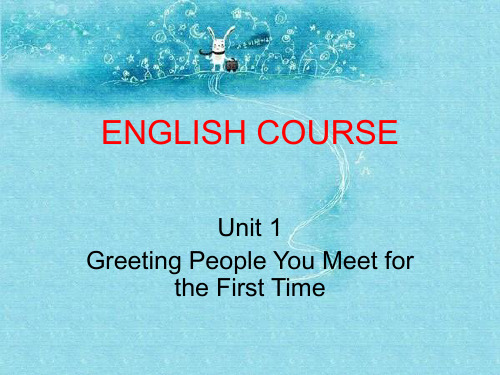
New Words and Phrases
• term
n. 术语;学期;期限;条款 vt. 把…叫做
e.g.: He failed no students this term.这学期他 没有给学生不及格。
• expert
adj. 熟练的;内行的;老练的 n. 专家;行家;能手 vt. 当专家;在…中当行家 e.g.: The expert elaborates his theory from his own reason. 这位专家详尽阐述他的学说。
New Words and Phrases
• professor n. 教授;教师;公开表示信仰的人
e.g. :The professor improvised a poem in the class. 教授在课堂上即兴创作了一首诗
• honor
n. 荣誉;信用;头衔 vt. 尊敬(等于honour);给…以荣誉 e.g. : Your honor brings to all of us. 你的荣誉给我们带来了荣耀。
ENGLISH COURSE
Unit 1 Greeting People You Meet for
the First Time
.
Dialogue A
• Receptionist: a person who receives people arriving in a hotel 接待员
• Technical: a. having special knowledge技 术的、工业的 \ technical school技术学 校
so involves the risk of failure 冒险(行动或事业) Joint venture 合资企业
E时代高职英语——综合教程(1)第一单元

I chose come to… (your college name) because I think it’s easier and cheaper for me.
M: I am in the Department of _____L_a__w______ and I am a freshman on the campus. How about you?
S: I have been studying here for two years.
M: Really? Could you do me a small favor and show me around? I want to take a tour of the campus.
Unit 1 A Brand New following questions with your partners.
1. What’s your first impression of your college? 2. What is your major? Why did you choose it? 3. What things would you like to do during college?
Unit 1 A Brand New Day
E时代高职英语——综合教程(1)
CONTENTS PAGE 目录页
Part
Part
Part
Part
Part
Part
1
2
3
4
5
6
高职英语(一)课件Unit 1
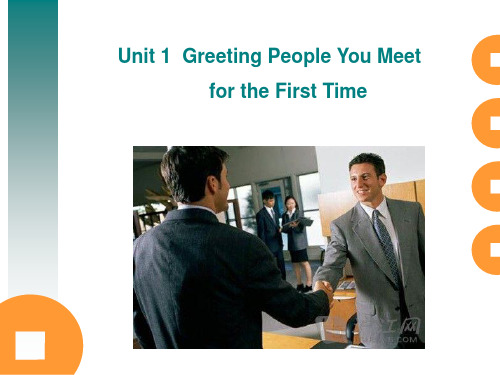
Answer the following questions according to Passage A.
1. Who is introducing the English Professor? Miss Wang, who is the secretary of the English Department.
是的 you here. Lizzy: That’s very kind of you.
为…做好 准备的
Li: You are welcome.
常见英文初次见面习惯用语:
1. Hi. I’m Li Ming. 2. Nice to meet you. 3. How do you do? 4. My name is Li Ming. What’s your name?
专家
11. author
作家
12. a dozen
许多;十二个
13. pleasure
荣幸之事
14. clap
鼓掌
Passage A Welcome
(Miss Wang is the secretary of the English Department. Now she is introducing professor Helen Waters to the students.)
airport.)
海外的
பைடு நூலகம்
Li: Hi, you must be Lizzy. I’m Li Hong from the technical school.
旅途
Lizzy: Oh, how do you do, Li Hong? Thank you for coming to meet me.
高职国际英语Book1-Unit1

_N_e_w_Y_o_r_k_. P_a_g_e_8_,_u_n_it__1.______________________
22. Who won the French Open in 2011?
Listening 1 Listening 2 Listening 3 Listening 4
Book 1 Unit 1 - People
Personal view – Text (B)
Text study
Background information Words and expressions Text
O__n_p_a_g_e_1_2_7_, _u_n_it_8_._________________________
19. Where can you find a form to fill out?
O__n_p_a_g_e_1_4_,_u_n_it_1_.__________________________
Book 1 Unit 1 - People
People and issues – Text (A)
Text study
Background information Words and expressions Text
Looking at the text Working with words Speaking Listening
P_h_o_e_b_e_P_r_i_nc_e_,_p_a_g_e_7_7_, _u_n_it_5_._________________
8. Where can you find a text about a dental appointment?
高职高专英语第一册Unit One

U n i t O n eWords and Expressionsmore ..., the more ...越…越…The more angry he became, the more she laughed at him.他越生气,她就越笑他。
the more ..., the less ...越…越不…The more difficult the questions are, the less likely I am to be able to answer them.问题越困难,我就越不可能回答2. (1)executive adj.决策和执行的a man of great executive ability决策与执行能力强的人执行者; 行政长官; [美]最高行政官(指州长或总统) ;行政部门; 执行委员会经理, 社长, 董事The president of a company is an executive.公司的经理是公司的管理者。
(2)(善于)执行的, 管理的, 行政的an executive committee执行委员会an executive branch行政部门executive authorities 行政当局executive board 董事会; 理事会Para. 21.career事业;职业My grandfather was a career teacher; it's the only job he'd ever done.我祖父教了一辈子书,教书是他所干过的唯一的工作。
make a career 在事业上有所成就At school we learn a variety of things.在学校我们学习各种东西The shopping-centre sells a variety of goods.这个购物中心出售许多种商品。
At school we learn a variety of things.在学校我们学习各种东西。
高职国际英语1unit

Unit 1 People1.Warming up:Using the phrases “How do you do? My name is .... Nice to meet you.” written on the board.2.Focus:The students are shown pictures of people meeting for the first time. They are also supplied with a dialogue which they can copy to say what they do when they meet somebody for the first time.They join their hands at palms and smile.They shake hands and smile.They bow from the waist and lower their eyes.Ask students to:1)Match nationalities with the pictures: which picture shows an Indianwoman? Which pictures shows two Japanese women? Which picture shows two Americans? Which pictures shows two Chinese men?2)Act out one of these greetings in class. The other students must guess howthey are greeting each other. Are you bowing from the waist and lowering your eyes? Are you shaking hands and smiling?3)Tell how they greet each other? How they greet older people? How theygreet their teachers? How they greet their parents and other relatives? And acting out these different ways for greeting people.3.Text A: greeting and introducing people1)New words reading2)Ask students what they can see in the pictures, how old they think thepeople are, what kind of occasion it could be and if they have a barbecue at home and what they barbecue.3)Ask students to read out the text loud paragraph by paragraph. Collect anywords which students have difficulty pronouncing. Writing these words on the board. Make a list on the board. Then repeat the words.4)Ask students the following questions:How to greet an older person when you meet him for the first time?Do you shake hands with an older person?Do you smile at an older person?How do you introduce yourself to an older person?What do you say to a younger person?How do you introduce somebody else to a younger person?What do you say to somebody you already know?How do you answer a younger person you know who greets you first?5)Pair work as Kate Miller and Sung Ling starting from line 17.6)Page 5-1: read out the sentences and then pair them.7)Page 5-2: check the meaning of the words before doing.4.Background information:1)student exchange: increase student’s understanding and tolerance of other cultures, as well as improving their language skills and broaden their social horizon.2)Barbecue: an outdoor meal, usually a form of social gathering at which meats, fish, or fowl, along with vegetables, are roasted over a wood or charcoal fire. 5.words and expressions:1)exchange partner2)BowThey bowed low to the chairman.He turned and bowed to his boss.Bow and arrowsHe took bow on stage to audience.3)Next-door neighbor4)LimpLimp handshakeShe let her whole body go limp.Mary had twisted her ankle and was limping. 一瘸一拐5)Friend--friendly unfriend--unfriendly--unfriendliness6)Informal--informally--informality7)Short period8)Formal--formally--formality9)Had better do10)Informal formal natural personal professional additional educational musical actual official regional industrial internationalmedical traditional cultural practical Speaking:1.Introducing yourself-let me introduce myself.My name is ...(full name)-Allow me introduce myself, My name is ...(full name)-Hello,I'm ....(full name)-I don't believe we met .I'm.... -Hi,my name is ....(first name) -Good( morning afternoon night …).My name is …(full name). 2.Introducing others-I’d like to introduce you to...-there is someone I’d like you to meet, this is...-Have you met...?3.Saying hello to someone you know 好友见面----Hi! Hello!一般男生想约某个女生(嘿嘿这话有点儿痞)--How you doing~比较熟悉的人见面Hi/Hey只要是朋友都能用的:How's everything? 一切都好?What's up? 近况如何?What's new? 有什么新鲜事?What's happening? 在忙什么?任何时后都可以用,但比较见外: How are you? 你好吗?适用于第一次见面: Nice to meet you. 。
高职国际进阶英语综合教程unit1课文原文和译文

高职国际进阶英语综合教程unit1课文原文和译文Text A Barbecue partySung Ling from Shanghai is staying with her exchange partner, Kate Miller, in San Francisco.On Ling’s first Saturday, the Millers have a barbecue in their garden. They want to introduce Ling to some of their neighbours. Kate also invites some of her friends from school.Before the barbecue, Ling is a little nervous. “What do I say when you introduce me to somebody?” she asks Kate.“Don’t worry, Ling,” Kate says. “It’s very easy. When I introduce you to an older person, for example Grant Summers, our next-door neighbour, I say, ‘Grant, this is Sung Ling from Shanghai. She’s my exchange partner.’ And then I say to you, ‘Ling, this is Grant Summers. He’s our next-door neighbour.’ And you just say, ‘How do you do, Mr Summers? It’s nice to meet you.’”“Yes, but do I shake hands or just smile?”“Well, with an older person you can shake hands and smile. But remember that in America, we like a firm handshake.”“Okay, Kate,” Ling says, “but what about when I want to introduce myself? Maybe you won’t be there.”“Well, if it’s an older person – Grant’s wife, Susan, for example – you just offer your hand and say, ‘How do you do? I’m Sung Ling from Shanghai. I’m Kate’s exchange partner.’”“And what will the other person say?” Ling asks.“Well, the other person will also say ‘How do you do?’ and tell you his or her name.”“Okay. I’ve got that. But what about younger people? You know, your friends from school.”“Well, just say, ‘Hi, I’m Ling, Kate’s exchange partner.’ It’s very informal.”“And what about people I already know?”“Well, if you see somebody you know after a short time, just say ‘Hello.’ But if you see them after a longer time, then you say, ‘How are you?’ or maybe ‘How are things?’”“And what do I answer if somebody greets me with ‘How are you, Ling?’”“Just say ‘Fine, thanks. And you?’ Then the other person says, ‘I’m fine, too. Thanks.’”“Okay. But I thought you said it’s very easy.”译文:上海来的宋玲与她的交换伙伴凯特·米勒一起住在旧金山。
高职国际进阶英语 Unit 1 People 课件

Unit 1 People
Place. Hometown
Focus
I come from ____,the capital of_____province. ______is my hometown. It is a beatutiful small city, and I love it very much. People in my hometown are nice and warm-hearted. I was born in _______. When I was 8 years old, my parents and I moved to______. Welcome to my hometown!
Progressive English for Vocational Colleges Book 1
Unit 1 People
Self Introduction
Good morning dear friends, how are you today? Please allow me to introduce myself. My name is Andy. I‘m 18 years old. I’m energetic and generous. I graduated from No.1 Occupation Technical Secondary School, Kunming. Now I‘m a freshman in Shanghai Institute of Technology. In my spare time, I like playing the piano and dancing. By the way, I like light music as well, it makes me relaxed. To travel around the world is my goal, that’s the reason why I choose cruise service as my major. That‘s all. Thank you!
高职国际英语课本电子版
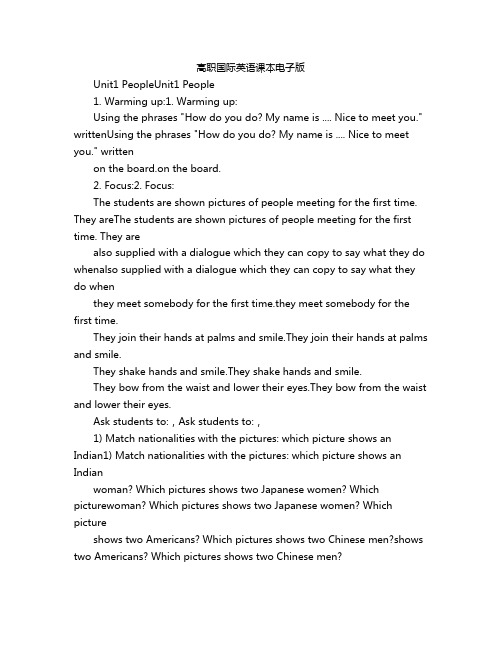
高职国际英语课本电子版Unit1 PeopleUnit1 People1. Warming up:1. Warming up:Using the phrases "How do you do? My name is .... Nice to meet you." writtenUsing the phrases "How do you do? My name is .... Nice to meet you." writtenon the board.on the board.2. Focus:2. Focus:The students are shown pictures of people meeting for the first time. They areThe students are shown pictures of people meeting for the first time. They arealso supplied with a dialogue which they can copy to say what they do whenalso supplied with a dialogue which they can copy to say what they do whenthey meet somebody for the first time.they meet somebody for the first time.They join their hands at palms and smile.They join their hands at palms and smile.They shake hands and smile.They shake hands and smile.They bow from the waist and lower their eyes.They bow from the waist and lower their eyes.Ask students to:,Ask students to:,1) Match nationalities with the pictures: which picture shows an Indian1) Match nationalities with the pictures: which picture shows an Indianwoman? Which pictures shows two Japanese women? Which picturewoman? Which pictures shows two Japanese women? Which pictureshows two Americans? Which pictures shows two Chinese men?shows two Americans? Which pictures shows two Chinese men?2) Act out one of these greetings in class. The other students must guess how2) Act out one of these greetings in class. The other students must guess howthey are greeting each other. Are you bowing from the waist and loweringthey are greeting each other. Are you bowing from the waist and loweringyour eyes? Are you shaking hands and smiling?your eyes? Are you shaking hands and smiling?3) Tell how they greet each other? How they greet older people? How they3) Tell how they greet each other? How they greet older people? How theygreet their teachers? How they greet their parents and other relatives? Andgreet their teachers? How they greet their parents and other relatives? Andacting out these different ways for greeting people.acting out these different ways for greeting people.。
高职国际进阶英语1Unit1People

Unit One PeopleSection I Listening and SpeakingUnit Goals:1. Grasp how to greet each other in English and practice fluently;2. Master focal language points (expressions and sentences) related to describing others;3. Get known the format of English email as well as principles of plural forms of countable nouns.I W arm-up Questions.(open)1. How much do you know about the way American and British people greet each other? What expressions do they often use?2. How do we Chinese greet others? What's the differences?Teacher guide students to discuss these questions with some complement of Chinese and western culture on greeting.II Class Activities1. Lead students to summarize the words, phrases and sentences frequently used according to what's discussed in warm-up questions. Encourage students to speak out the sentences under the guidance of teacher, paying attention to the pronunciation and the intonation.The way native English speakers greet each other:Greetings at the first meeting Responses(1) How do you do? How do you do?(2) Nice/ Glad to meet you. Nice/ Glad to meet you, too.(3) Hi. Have we met before? No, I don’t think so.Greetings when meeting again Responses(1) Hello, How are things with you? Quite well. And you?(2) How are you doing? Good, thank you.What are you doing these days? Nothing particular.(3) Fancy seeing you here, Lily! Y eah, fancy that.The way native English speakers introduce themselves:(1) Mr. David , allow me to introduce myself. My name is Zhou Wei, manager of thecompany.(2) I’m Robert Miller from America. Please call me Robert.(3) Before we start, let me introduce myself.The way native English speakers exchange their personal information:(1) Here/This is my name card.(2) Thank you. Here is mine.(3) Please call me or e-mail me if you need any help.The way native English speakers say goodbye to each other:(1) Bye. (2) So long. (3) Take care. (4) Have a good day.(5) See you next time. (6) Pleased/ Glad to have met you.2. Role-playAsk students to work in groups of two or three. Give them several minutes to prepare an introduction of themselves, then introduce themselves to each other.Make a dialogue about two old friends meeting again. Perform it in class.ⅢListening Practice.Before starting, teacher share a beautiful song "say hello" with students, asking them to fill in the blanks of the lyrics while listening to the song, to cultivatestudents' interest on listening practice.Listen to the record in Listening 3 and Listening 4, and try to get more materials from this section.Teacher may help students get familiar with some expressions to get better understanding of the listening materials.(1)Listening 3Keys: T F T T T F(2) Listening 4Keys: you, thanks, This, nice, do, where, Australia, drink, please, like(3) ViewingEnjoy something more challenging---a video with some questions for students. Before starting, teacher ask students to discuss a question:How can you tell the receptionist what you are there for?Students share and exchange their ideas in groups.Keys: 2. b a a b a b b c3. help, appointment, minutes, introduce, pleasureTeacher may ask students to role-play the scene in the video and choose one or two groups to perform in class.ⅣAssignment1. Prepare a short dialogue on greeting and perform it next time.2. Preview Passage B.Unit One PeopleSection II Passage BBlind DateI Pre-Class Activities (Open).II Passage B--Blind Dateⅰ.Lead-in:W arm-up discussion:What’s blind date? How much do you know about it? (with reference to PPT)ⅱ.Guided Reading of the PassageStudents read the passage by themselves, trying to catch the main idea of the passages and decide whether the statements are true of false on P14. Divide students into two groups by gender and require them to discuss in groups to pick out the difficult words and expressions in the passage.The teacher will demonstrate the usage of those chosen points, then guide students to make up some sentences with them in groups.ⅲ. Expressions and Sentences1)date n.(男女间的) 约会have a date (with sb) ; go on a date (with sb)(与某人)约会e.g. I heard that Phil would have a date with Mary this evening.vi. & vt.约会,与……约会e.g. He wrote a letter, asking her mother to allow him to date her.blind date(不认识的男女)初次约会,相亲e.g. Many Chinese parents would like to arrange blind dates for their sons or daughters.Internet dating site 交友网站,约会网站e.g. I would never have thought of this, but , the Internet dating site, came to me three years ago and asked me that question.2) suit n. (男士的)一套外衣,套装,西装e.g. I remember that he was wearing a dark suit.cf: suite [swiːt] n. [计](软件的)套件;(房间,器具等)一套,一副;[乐]组曲;随从e.g. He moved from his hotel suite into a modest flat.a three-piece suite 三件套沙发The last chords of the suite build to a crescendo.3) fancy vt.爱慕,喜爱; 想象,幻想e.g. The boys would tease you to death if they didn’t fancy you.She fancied he was trying to hide a smile.4) mood n. 心情,心境e.g. He is clearly in a good mood today.be in no mood for/ to do sth 没心情做某事e.g. He was in no mood to celebrate.be in the mood for/ to do sth 有心情做某事e.g. After a day of air and activity, you should be in the mood for a good meal.5) wonder vi. & vt.(对……)感到好奇或疑惑,想知道wonder if/whether ... 想知道是否…… ;wonder how/what/when etc ... 想知道怎样/什么/何时……e.g. I wonder whether I should offer him a job.cf. wander ['wɒndə] vi. & vt.漫步,漫游n. 游荡;溜达;失散e.g. A man was found wandering in the hills.His mind began to wander. 他开始走神了。
复习课件高职国际英语1unit.doc
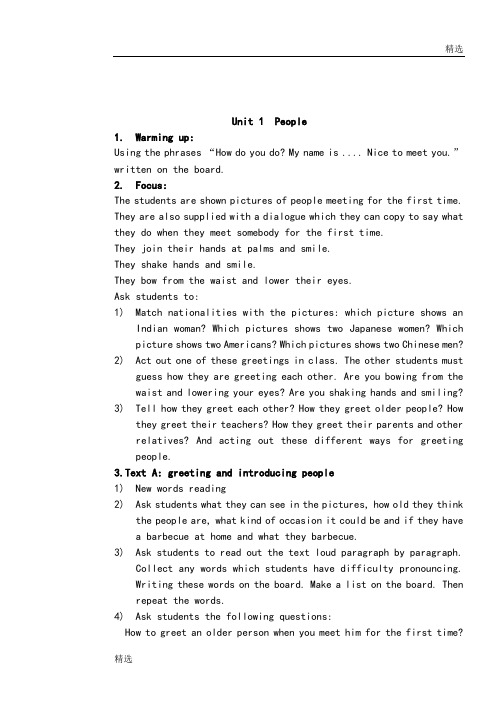
Unit 1 People1.Warming up:Using the phrases “How do you do? My name is .... Nice to meet you.”written on the board.2.Focus:The students are shown pictures of people meeting for the first time. They are also supplied with a dialogue which they can copy to say what they do when they meet somebody for the first time.They join their hands at palms and smile.They shake hands and smile.They bow from the waist and lower their eyes.Ask students to:1)Match nationalities with the pictures: which picture shows anIndian woman? Which pictures shows two Japanese women? Which picture shows two Americans? Which pictures shows two Chinese men?2)Act out one of these greetings in class. The other students mustguess how they are greeting each other. Are you bowing from the waist and lowering your eyes? Are you shaking hands and smiling?3)Tell how they greet each other? How they greet older people? Howthey greet their teachers? How they greet their parents and other relatives? And acting out these different ways for greeting people.3.Text A: greeting and introducing people1)New words reading2)Ask students what they can see in the pictures, how old they thinkthe people are, what kind of occasion it could be and if they havea barbecue at home and what they barbecue.3)Ask students to read out the text loud paragraph by paragraph.Collect any words which students have difficulty pronouncing.Writing these words on the board. Make a list on the board. Then repeat the words.4)Ask students the following questions:How to greet an older person when you meet him for the first time?Do you shake hands with an older person?Do you smile at an older person?How do you introduce yourself to an older person?What do you say to a younger person?How do you introduce somebody else to a younger person?What do you say to somebody you already know?How do you answer a younger person you know who greets you first?5)Pair work as Kate Miller and Sung Ling starting from line 17.6)Page 5-1: read out the sentences and then pair them.7)Page 5-2: check the meaning of the words before doing.4.Background information:1)student exchange: increase student’s understanding and tolerance of other cultures, as well as improving their language skills and broaden their social horizon.2)Barbecue: an outdoor meal, usually a form of social gathering at which meats, fish, or fowl, along with vegetables, are roasted overa wood or charcoal fire.5.words and expressions:1)exchange partner2)BowThey bowed low to the chairman.He turned and bowed to his boss.Bow and arrowsHe took bow on stage to audience.3)Next-door neighbor4)LimpLimp handshakeShe let her whole body go limp.Mary had twisted her ankle and was limping. 一瘸一拐5)Friend--friendly unfriend--unfriendly--unfriendliness6)Informal--informally--informality7)Short period8)Formal--formally--formality9)Had better do10)Informal formal natural personal professional additional educational musical actual official regional industrial international medical traditional cultural practicalSpeaking:1.Introducing yourself-let me introduce myself.My name is ...(full name)-Allow me introduce myself, My name is ...(full name) -Hello,I'm ....(full name) -I don't believe wemet .I'm....-Hi,my name is ....(first name)-Good( morning afternoon night …).My name is …(full name). 2.Introducing others-I’d like to introduce you to... -there is someone I’d like you to meet, this is...-Have you met...?3.Saying hello to someone you know 好友见面----Hi! Hello!一般男生想约某个女生(嘿嘿这话有点儿痞)--How you doing~比较熟悉的人见面 Hi/Hey只要是朋友都能用的:How's everything? 一切都好?What's up? 近况如何?What's new? 有什么新鲜事?What's happening? 在忙什么?任何时后都可以用,但比较见外: How are you? 你好吗?适用于第一次见面: Nice to meet you. 。
高职国际英语1 unit 1教学文案

高职国际英语1u n i t1Unit 1 People1.Warming up:Using the phrases “How do you do? My name is .... Nice to meet you.”written on the board.2.Focus:The students are shown pictures of people meeting for the first time. They are also supplied with a dialogue which they can copy to say what they do when they meet somebody for the first time.They join their hands at palms and smile.They shake hands and smile.They bow from the waist and lower their eyes.Ask students to:1)Match nationalities with the pictures: which picture shows anIndian woman? Which pictures shows two Japanese women?Which picture shows two Americans? Which pictures shows twoChinese men?2)Act out one of these greetings in class. The other students mustguess how they are greeting each other. Are you bowing from the waist and lowering your eyes? Are you shaking hands and smiling?3)Tell how they greet each other? How they greet older people? Howthey greet their teachers? How they greet their parents and otherrelatives? And acting out these different ways for greeting people.3.Text A: greeting and introducing people1)New words reading2)Ask students what they can see in the pictures, how old they thinkthe people are, what kind of occasion it could be and if they have a barbecue at home and what they barbecue.3)Ask students to read out the text loud paragraph by paragraph.Collect any words which students have difficulty pronouncing.Writing these words on the board. Make a list on the board. Thenrepeat the words.4)Ask students the following questions:How to greet an older person when you meet him for the first time?精品资料Do you shake hands with an older person?Do you smile at an older person?How do you introduce yourself to an older person?What do you say to a younger person?How do you introduce somebody else to a younger person?What do you say to somebody you already know?How do you answer a younger person you know who greets you first?5)Pair work as Kate Miller and Sung Ling starting from line 17.6)Page 5-1: read out the sentences and then pair them.7)Page 5-2: check the meaning of the words before doing.4.Background information:1)student exchange: increase student’s understanding and tolerance of other cultures, as well as improving their language skills and broaden their social horizon.2)Barbecue: an outdoor meal, usually a form of social gathering at which meats, fish, or fowl, along with vegetables, are roasted over a wood or charcoal fire.5.words and expressions:1)exchange partner2)BowThey bowed low to the chairman.He turned and bowed to his boss.Bow and arrowsHe took bow on stage to audience.3)Next-door neighbor4)LimpLimp handshakeShe let her whole body go limp.Mary had twisted her ankle and was limping. 一瘸一拐5)Friend--friendly unfriend--unfriendly--unfriendliness6)Informal--informally--informality7)Short period精品资料8)Formal--formally--formality9)Had better do10)Informal formal natural personal professional additional educational musical actual official regional industrial international medical traditional cultural practical精品资料Page7 listening 1:Before playing the recording get students to read the sentences 1 to 6, first quietly to themselves, then aloud. Make sure that everybody has understood the sentences.Now play the recording and get students to do the exercise. Be prepared to play the recording as often as the students need it. Patrick: good morning. Excuse me, but are you Ms Susan Garner from Chicago, please?Susan: that’s right.Patrick: how do you do, Ms Garner? I’m Patrich Choy. It’s nice to meet you. I’ve come to take you to your hotel.Susan: how do you do, Mr Choy. It’s nice to meet you, too. Look, may i introduce you to one of my colleagues? This is tony Hunter. Tony, this is Patrick Choy. He’s come to take us to our hotel. Tony: Fine. How do you do, Mr Choy? It’s a pleasure to meet you. Patrick: How do you do, Mr Hunter. Welcome to Hongkong. Tony: Thank you. I’ve heard so many good things about Hongkong精品资料that it’s wonderful to be here.Patrick: that’s nice to hear. Now, could you come this way, please? The car’s just outside the building. It’s not far.Ask students to read out the sentences and say whether they are true or false.精品资料Text B: Blind Date1.Background information:1)Blind date: it usually occurs when the two people previously notknowing each other are going out on a date set up by another person who knows both people. Today, most blind dates are n’t totally blind per se, thanks to online social sites such as Facebook and MySpace, where many people have photographs of themselves that are easily accessible by others.2)Geocaching地理寻宝游戏: is a high tech version of hide and seekand an outdoor recreational activity, in which the participants explore the outdoors in search of hidden “treasure” and adventure by using a GPS receiver or mobile device and other navigational techniques.2.Words and expressions:1)Internet dating site2)I could not believe my eyes.3)She began modelling in Paris aged 15.4)Glamour--glamorous5)Suit--suitable6)All the girls fancied him.Linda took quite a fancy to him.What do you fancy doing?I just fancied a drink.7)tongue-tied8) A generous glass of wine一大杯酒; generosity 大量充足精品资料9)Tip the waiter a dollar10)Striped tie条纹领带11)Tie up your shoelaceI tied a knot in the rope.12)i can’t stand.13)Ignore--ignorant--ignorance14)Be in no mood for.../to do...没心情做某事Be in the mood for../to do...有心情做某事Be in a mood情绪不好15)misery--miserable--miserably16)Regret--regrettable--regrettably17)Straight away 马上18)Hopefully 但愿19)Strike up a conversation with sb.搭讪攀谈 strick--struck20)Be in conversation with sb. 正在谈话21)Make conversation 搭话找话说说应酬话精品资料精品资料。
高职国际英语1 Unit 1 People
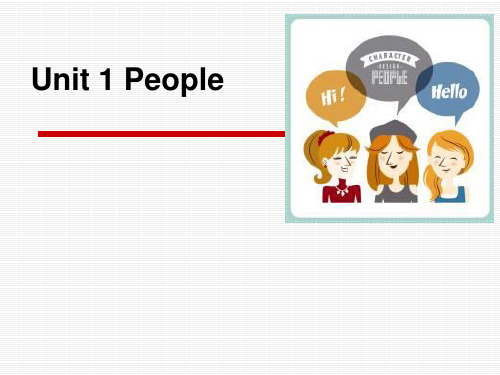
speaking
Greeting somebody you already know
A: Good morning, XX. It's nice to see you again. B: Oh, hello, XX. How are you? A: Fine, thanks. And you? B: I'm fine, too. thanks.
describe the pictures
Indian: join hands with palms together and smile
In the first picture, there is an indian lady who is smiling and who has joined her hands together.
text A-greeting and introducing people
news words: read
what can you see from the pictures? how old are they? what is the occasion ? what are they barbecuing?
language summary
1. introducing yourபைடு நூலகம்elf --How do you do? I’m …(name) --May I introduce myself? My name’s …(name)
2. Introducing others --…(name), this is a friend of mine, …(name). --…(name), may I introduce…(name)? --…(name), you don’t know…(name), do you?
- 1、下载文档前请自行甄别文档内容的完整性,平台不提供额外的编辑、内容补充、找答案等附加服务。
- 2、"仅部分预览"的文档,不可在线预览部分如存在完整性等问题,可反馈申请退款(可完整预览的文档不适用该条件!)。
- 3、如文档侵犯您的权益,请联系客服反馈,我们会尽快为您处理(人工客服工作时间:9:00-18:30)。
9) How does Ling introduces herself to a younger person? Hi, I'm Ling, Kate's exchange partner. (informal) 10) What do you say to somebody you already know? if you see them after a short period, you just say "hello". if you see them after a long time, you say,"how are you?" or " how are things?" 11) How do you answer a younger person you know who greets you first? Fine, thanks, and you?
Frenchman: kiss on the cheeks
In the second picture, there are two frenchmen who are kissinБайду номын сангаас on the cheeks.
Japanese, bow from waist and lower eyes
In the third picture, there are two Japanese women who are bowing from waist and lowering their eyes.
Listening1: 原文
Patrick: Good morning. Excuse me, but are you Ms Susan Garner from Chicago, please? Susan: that’s right. Patrick: How do you do, Ms Garner? I am Patrick Choy. Its nice to meet you. I’ve come to take you to your hotel. Susan: How do you do, Mr. Choy. It’s nice to meet you, too. Look, may I introduce you to one of my colleagues? This is Tony Hunter. Tony, this is Mr. Patrick Choy. He’s come to take us to our hotel.
Greeting and introducing people
useful expressions: have a baebecue in their garden introduce...to... wonder had better do something ask...for help that's that=that's it=that's all offer your hand
In the....picture, there are ....who is/are....
What do people do in different cultures?
In India, it is usual to join hands with palms together and smile. In france,... In Japan,... In America,... In China,...
speaking
Greeting somebody you already know
A: Good morning, XX. It's nice to see you again. B: Oh, hello, XX. How are you? A: Fine, thanks. And you? B: I'm fine, too. thanks.
Tony: Fine. How do you do, Mr. Choy? It’s a pleasure to meet you. Patrick: How do you do, Mr. Hunter. Welcome to Hong Kong. Tony: Thank you. I’ve heard so many good things about Hong Kong that it’s wonderful to be here. Patrick: That’s nice to hear. Now, could you come this way, please? The car’s just outside the building. Its not far.
speaking
Introduce your partenter to somebody else
A: XX(B), may I introduceXX(C)? B:How do you do, XX(C)? It's nice to meet you. C: How do you do. it's nice to meet you, too, XX(B).
speaking
Role play: kate introduces Ling to others: e.g. Grant, this is Sung Ling from Shanghai. She's my exchange partner. xx, this is xx from....She/he is... Introduce yourself to others e.g. How do you do? I'm Sung Ling from Shanghai. I'm Kate's exchange partner. How do you do? I'm xx from... I'm...
language summary
1. introducing yourself --How do you do? I’m …(name) --May I introduce myself? My name’s …(name)
2. Introducing others --…(name), this is a friend of mine, …(name). --…(name), may I introduce…(name)? --…(name), you don’t know…(name), do you?
text A-greeting and introducing people
news words: read
what can you see from the pictures? how old are they? what is the occasion ? what are they barbecuing?
American and Chinese: shake hands and smile
In the fourth picture, there are two Americans/ two Chinese people who are shaking hands and smiling.
what can you see in the picture?
6) Does American enjoy a firm handshake or a limp handshake? why? firm handshake, because a limp handshke is a little unfriendly. 7) How can Ling introduce herself to an older person, Grant's wife? offer hands and say: How do you do? I'm Sung Ling from Shanghai. I'm Kate's exchange partner. 8) What will Grant say when Ling introduces herself to him ? How do you do? I'm Grant Summers from the next door. welcome to San Francisco.
Greeting
what do you do when you meet somebody for the first time? A. I say hello. B. I shake hands with him and smile. C. I bow from the waist d. I join my hands with palms together
give his\her name i see from next door have got that greet somebody with... I thought...
1) How can kate introduce Ling to an older person, Grant Summers? Grant, this is Sung Ling from Shanghai. She's my exchange partner. 2) How dose Kate introduce Grant to Ling? Ling, this is Grant Summers. He's our next-door neighbor. 3) What does Ling say when Kate introduces her to Grant? How do you do, Mr Summers? It's nice to meet you. 4) Should Ling shake hands with Grant? 5) Should Ling smile at Grant?
